'Dynamic' conditions and conflict zone uncertainty: Behind Singapore's airdrop mission in Gaza
Three members of the Singapore Armed Forces team involved tell the story behind the operation.
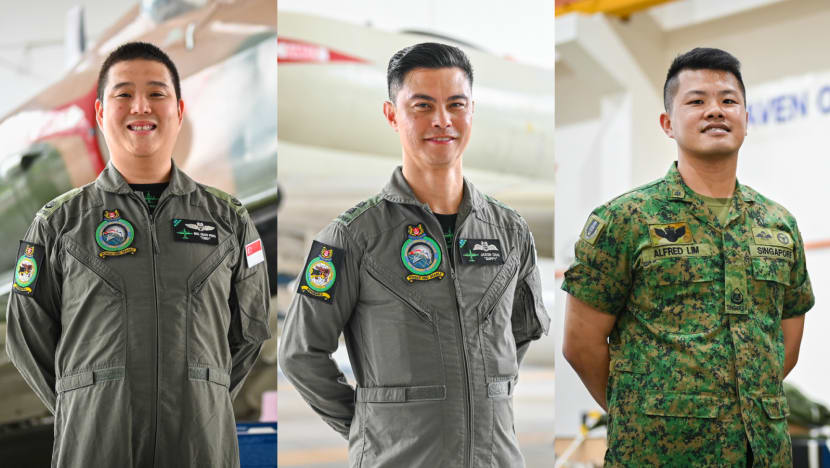
The Singapore Armed Forces' C-130 crew involved in the Gaza airdrop mission (from left) Third Warrant Officer Eng Guan Peng, Lieutenant-Colonel Jason Chai and Third Warrant Officer Alfred Lim. (Photo: CNA/Syamil Sapari)

This audio is generated by an AI tool.
SINGAPORE: Over war-torn Gaza the aircraft flew, bearing the Singapore flag and bearing containers of supplies floating their way to the ground.
The Republic of Singapore Air Force’s (RSAF) C-130 transport plane had been deployed, via Jordan, to air-drop over 20 tonnes of food - equivalent to more than 59,000 meals - over two weeks in March.
This was Singapore’s third tranche of humanitarian aid for the Palestinian city, which has undergone waves of retaliatory strikes since Hamas militants attacked southern Israel in October 2023.
On Tuesday (Jun 25), Singapore's Minister for Defence Ng Eng Hen presented 66 overseas service medals to Singapore Armed Forces (SAF) personnel who were involved in various missions, including the team that provided humanitarian assistance to Gaza.
The C-130 crew was in fact conducting its first airdrop operation in a conflict zone, though those who spoke to CNA stressed they were well-prepared and ready for the mission.
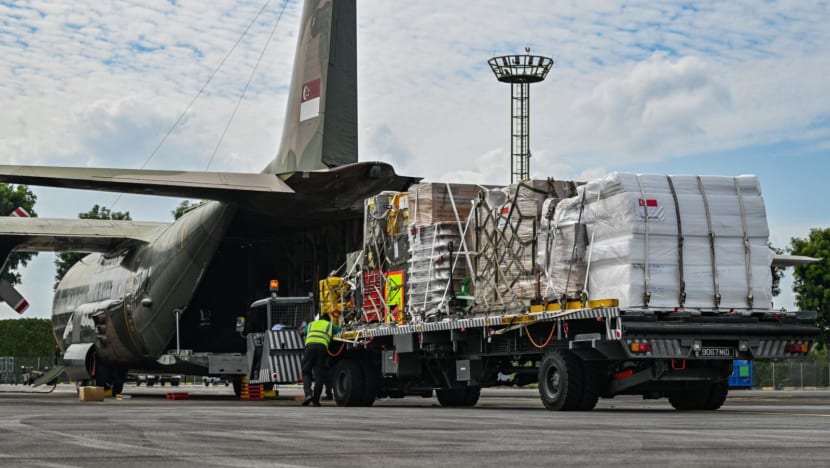
The crew's time in Jordan was filled with daily meetings with the Royal Jordanian Air Force, with both sides huddling to assess the feasibility of drop zones - and with the safety of civilians foremost in their minds, said Lieutenant Colonel (LTC) Jason Chai, air mission commander of the Gaza airdrop operation.
"We don’t just drop over any area. We make sure that it’s a clear area; suitable size before we proceed with the mission," the 43-year-old added.
LTC Chai, who is also the commanding officer of RSAF’s 122 Squadron, said his crew's "years of training" gave them the confidence and assurance that the aid was going to land "exactly" where they wanted it.
The safety of airdrop operations conducted by militaries in Gaza was called into question after a string of incidents involving civilian deaths. In late March, 12 people drowned while trying to reach aid dropped off a beach.
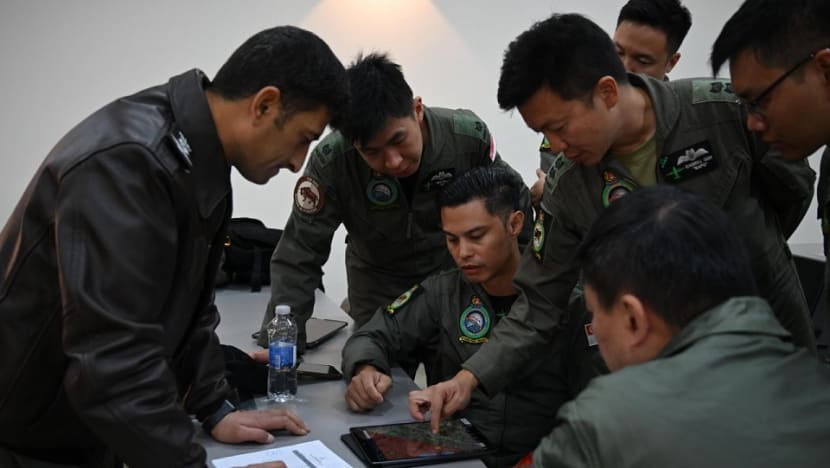
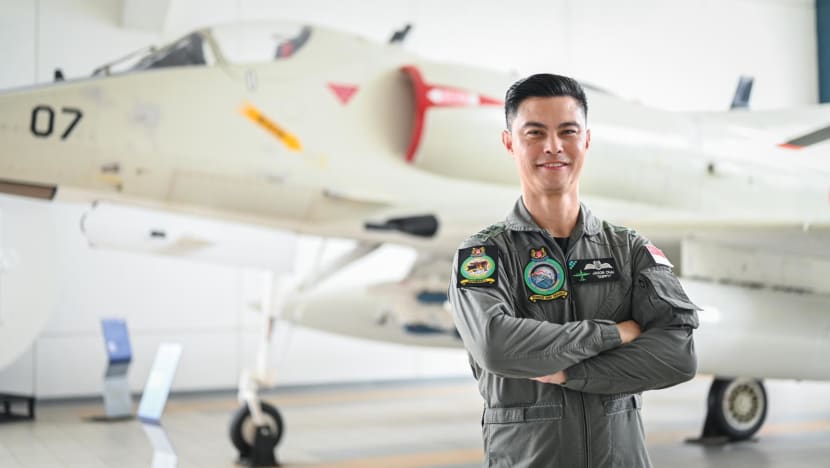
CRITICAL STEPS
At the planning stage, the SAF team also prepared for emergencies by running through various scenarios such as aircraft malfunctions, said LTC Chai.
Next was rigging the supply loads - essentially strapping them up and attaching parachutes - and this was where 3rd Warrant Officer (3WO) Alfred Lim came in.
As an operations warrant officer at the Singapore Army’s Air Terminal Company, he helped plan and ensure that rigging and inspection schedules were met.
This was often a "dynamic" situation with airdrop schedules only forecast a day in advance, and the team needing to adapt to changes on the fly.
Once, an airdrop operation was cancelled due to bad weather - but the team just used the downtime to prepare more loads for future missions, recalled 3WO Lim, who's part of the SAF's third transport battalion.
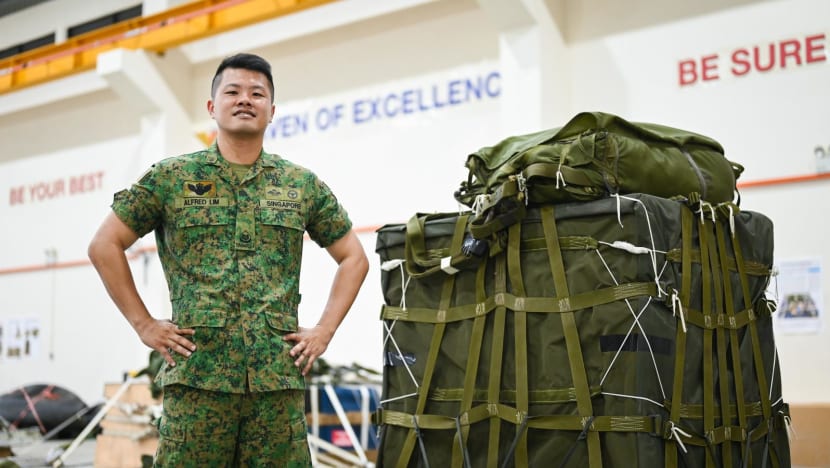
Meanwhile, the crew’s loadmasters - those responsible for cargo - would also be preparing the aircraft for the airdrop. Once done, they would inspect the loads together with the transport battalion.
This joint inspection is a detailed process critical to the safety and air-readiness of the loads, said 3WO Lim.
After the supplies are loaded onto the aircraft and prepared for the airdrop, the loadmasters and transport battalion would conduct yet another round of checks.
RELEASING THE AID
While inspections involved a handful of personnel, the airdrop mission itself only needed two loadmasters on board.
Before the aircraft enters a drop zone, the loadmasters would start removing the straps securing the loads. When the time comes, the back door of the aircraft would be opened for the loads to roll out by gravity.
A key challenge was the uncertainty that came with flying over a conflict zone, said one of the loadmasters, 122 Squadron's 3WO Eng Guan Peng.
In contrast to airdrop training and exercises where timeslots are fixed, the Gaza operation required coordination with planners in the crew
"It doesn’t mean you always get to go in and do the drop that you’ve planned for," said 3WO Eng.
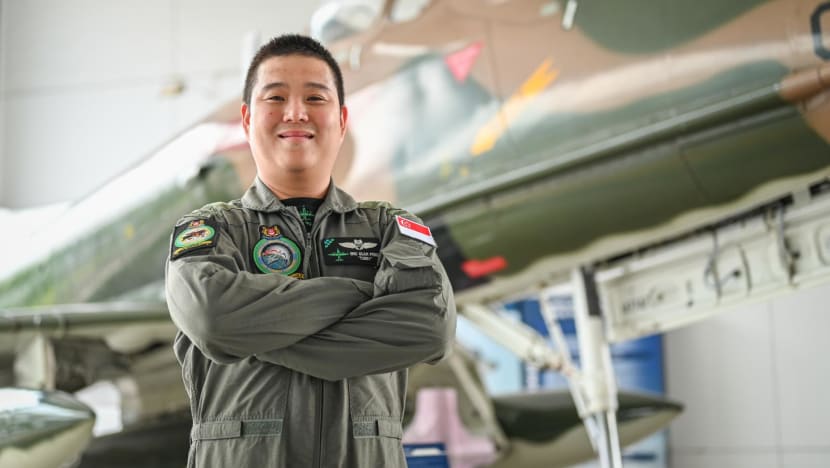
Cold weather and strong winds also posed obstacles. For one, the crew had to bring supplies closer to the aircraft before loading them, to prevent them from toppling due to gusts.
"That’s something different that we never really experienced during our training," said 3WO Eng.
The SAF crew returned to Singapore in early April, after two weeks in Jordan.
Looking back, 3WO Eng said the conflict and wreckage he witnessed in Gaza would "never leave (his) mind".
"It’s something that you don’t really want to see. It (got) me thinking how fortunate we really are as Singaporeans."
Defence Minister Dr Ng acknowledged the complexity and urgency of the aid mission in a speech at Tuesday's medal ceremony.
"You have ... alleviated the suffering of affected communities in Gaza on behalf of Singapore," he said.
The mission demonstrated the SAF's ability to respond quickly and effectively to incidents, and gives confidence that Singapore can play a "positive role in a troubled world", Dr Ng added.
"This confidence is much needed because the security environment will continue to be difficult ... We must expect surprises and more contingencies that the SAF will have to respond to in the future."
















